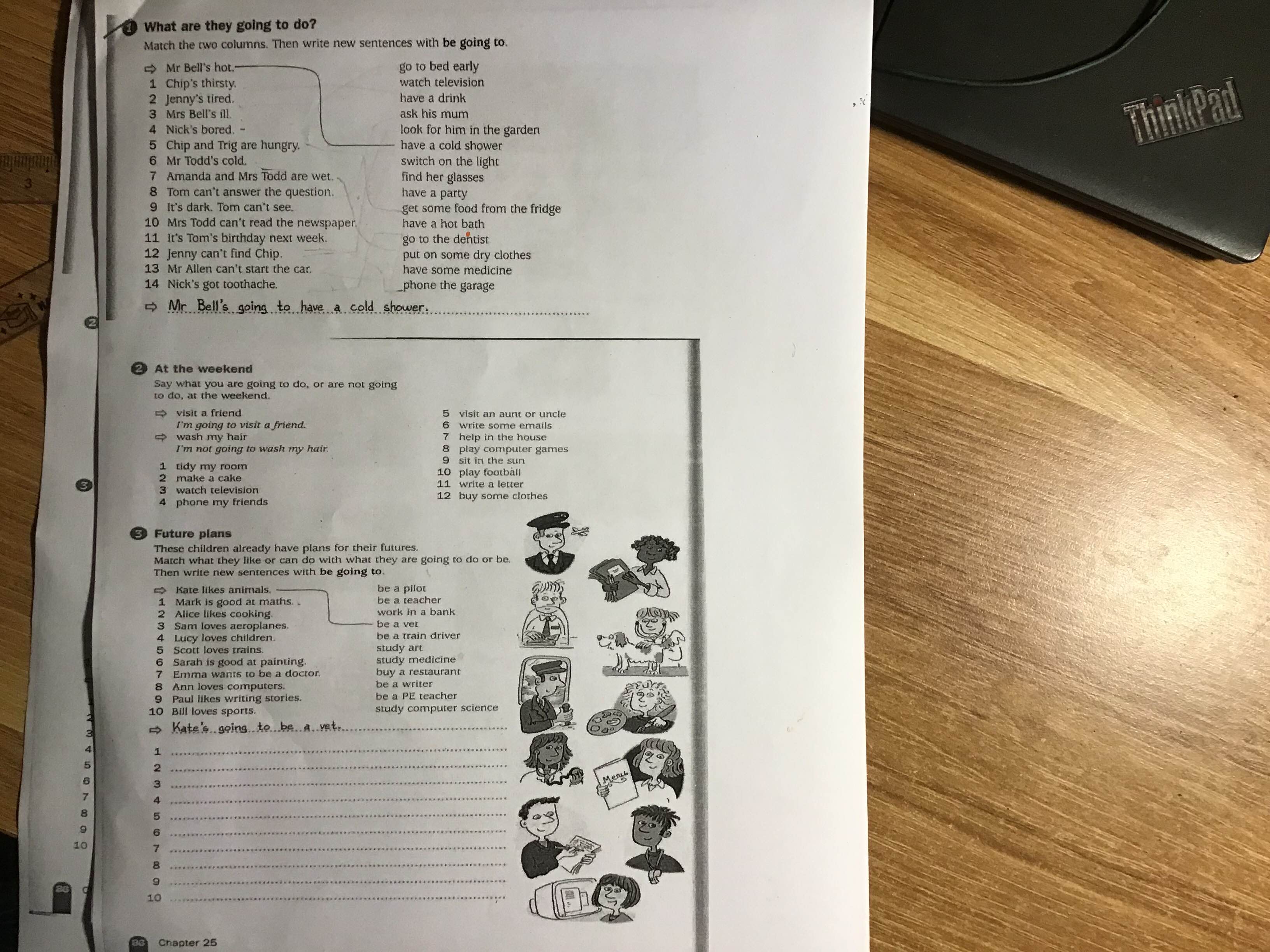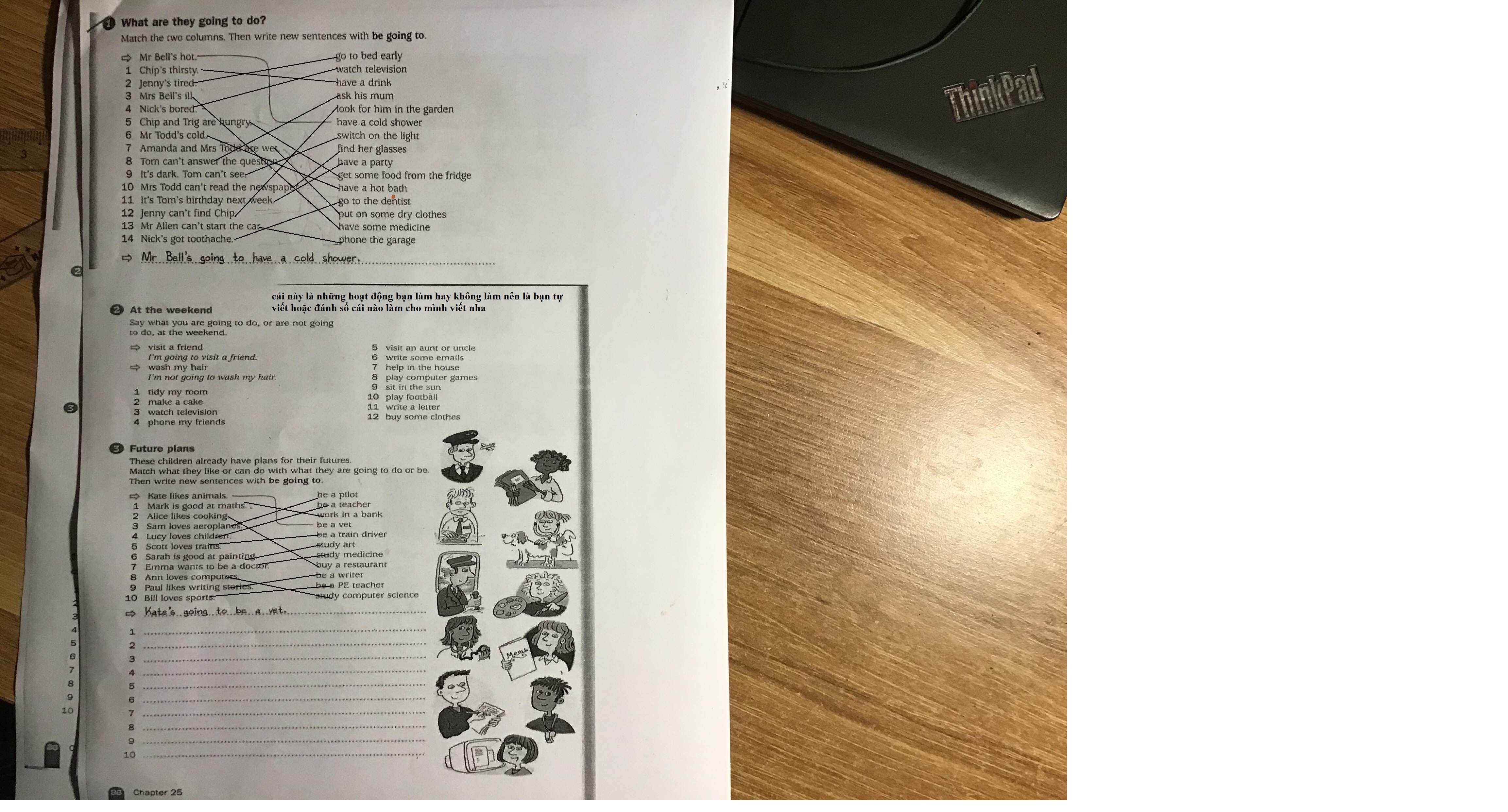Mọi người làm giúp e bài 3 nhé. Nếu làm được giúp e bài 1 thì càng tốt

Hãy nhập câu hỏi của bạn vào đây, nếu là tài khoản VIP, bạn sẽ được ưu tiên trả lời.



\(Bài.1:\\ a,3x-9y=3\left(x-3y\right)\\ b,x^2-5x=x\left(x-5\right)\\ c,\left(x-3\right)\left(x-5\right)-\left(2x+1\right)\left(3-x\right)=\left(x-3\right)\left(x-5\right)+\left(x-3\right)\left(2x+1\right)\\ =\left(x-3\right)\left(x-5+2x+1\right)=\left(x-3\right)\left(3x-4\right)\\ d,3x^3+6x^2+3x=3x\left(x^2+2x+1\right)=3x\left(x+1\right)^2\\ e,3\left(x+5\right)-x^2-5x=3\left(x+5\right)-x\left(x+5\right)\\ =\left(x+5\right)\left(3-x\right)\)
\(Bài.2:\\ a,x^3-9x=0\\ \Leftrightarrow x.\left(x^2-9\right)=0\\ \Leftrightarrow x\left(x-3\right)\left(x+3\right)=0\\ \Leftrightarrow\left[{}\begin{matrix}x=0\\x+3=0\\x-3=0\end{matrix}\right.\Leftrightarrow\left[{}\begin{matrix}x=0\\x=-3\\x=3\end{matrix}\right.\\ b,5x\left(x+2\right)-3\left(x+2\right)=0\\ \Leftrightarrow\left(5x-3\right)\left(x+2\right)=0\\ \Leftrightarrow\left[{}\begin{matrix}5x-3=0\\x+2=0\end{matrix}\right.\Leftrightarrow\left[{}\begin{matrix}x=\dfrac{3}{5}\\x=-2\end{matrix}\right.\\ c,x^2-7x=0\\ \Leftrightarrow x\left(x-7\right)=0\\ \Leftrightarrow\left[{}\begin{matrix}x=0\\x-7=0\end{matrix}\right.\Leftrightarrow\left[{}\begin{matrix}x=0\\x=7\end{matrix}\right.\)

11 c)
\(a^2+2\ge2\sqrt{a^2+1}\Leftrightarrow a^2+1-2\sqrt{a^2+1}+1\ge0\Leftrightarrow\left(\sqrt{a^2+1}-1\right)^2\ge0\) (luôn đúng)
12 a) Có a+b+c=1\(\Rightarrow\) (1-a)(1-b)(1-c)= (b+c)(a+c)(a+b) (*)
áp dụng BĐT cô-si: \(\left(b+c\right)\left(a+c\right)\left(a+b\right)\ge2\sqrt{bc}2\sqrt{ac}2\sqrt{ab}=8\sqrt{\left(abc\right)2}=8abc\) ( luôn đúng với mọi a,b,c ko âm )
b) áp dụng BĐT cô-si: \(c\left(a+b\right)\le\dfrac{\left(a+b+c\right)^2}{4}=\dfrac{1}{4}\)
Tương tự: \(a\left(b+c\right)\le\dfrac{1}{4};b\left(c+a\right)\le\dfrac{1}{4}\)
\(\Rightarrow abc\left(a+b\right)\left(b+c\right)\left(c+a\right)\le\dfrac{1}{4}\dfrac{1}{4}\dfrac{1}{4}=\dfrac{1}{64}\)

Trả lời bằng Tiếng Việt nhé.
Bài 1.
Nếu đi với vận tốc \(50m/min\)thì sẽ đến trường muộn hơn đi với vận tốc \(60m/min\)số phút là:
\(2+1=3\)(phút)
Mỗi mét đi với vận tốc \(50m/min\)hết số phút là:
\(1\div50=\frac{1}{50}\)(phút)
Mỗi mét đi với vận tốc \(60m/min\)hết số phút là:
\(1\div60=\frac{1}{60}\)(phút)
Mỗi mét đi với vận tốc \(60m/min\)nhanh hơn mỗi mét đi với vận tốc \(50m/min\)số phút là:
\(\frac{1}{50}-\frac{1}{60}=\frac{1}{300}\)(phút)
Quãng đường từ nhà đến trường dài:
\(3\div\frac{1}{300}=900\left(m\right)\)
Bài 2.
Để lấy được ít nhất \(20\)cái bút cùng màu thì ta cần lấy ra hết số bút có ít hơn \(20\)cái, số bút có từ \(20\)cái trở lên ta lấy mỗi loại \(19\)cái, sau đó ta lấy thêm \(1\)cái nữa thì chắc chẵn sẽ được ít nhất \(20\)cái bút có cùng màu.
Số bút ít nhất cần lấy ra là:
\(8+12+19+19+1=59\)(cái)

1.
\(Ca+2H_2O\rightarrow Ca\left(OH\right)_2+H_2\)
\(2Na+2H_2O\rightarrow2NaOH+H_2\)
\(P_2O_5+3H_2O\rightarrow2H_3PO_4\)
\(K_2O+H_2O\rightarrow2KOH\)
\(SO_2+H_2O\rightarrow H_2SO_3\)
\(SO_3+H_2O\rightarrow H_2SO_4\)
2.
(1)\(2KMnO_4\rightarrow\left(t^o\right)K_2MnO_4+MnO_2+O_2\)
(2)\(2Cu+O_2\rightarrow\left(t^o\right)2CuO\)
(3)\(CuO+H_2\rightarrow\left(t^o\right)Cu+H_2O\)
(4)\(4Na+O_2\rightarrow\left(t^o\right)2Na_2O\)
(5)\(Na_2O+H_2O\rightarrow2NaOH\)
(6)\(S+O_2\rightarrow\left(t^o\right)SO_2\)
(7)\(SO_2+H_2O\rightarrow H_2SO_3\)
(1) 2KMnO4 --to--> K2MnO4 + MnO2 + O2
(2) 2Cu + O2 --to--> 2CuO
(3) CuO + CO --to--> Cu + CO2
(4) 4Na + O2 --to--> 2Na2O
(5) Na2O + H2O ---> 2NaOH
(6) S + O2 --to--> SO2
(7) SO2 + H2O ---> H2SO3

(871-28)+ (-2004+28-871)
=871- 28 -2004 +28 -871
=(871-871)+(-28+28)-2004
=0+0-2004
=-2004

2\(\sqrt{\dfrac{16}{3}}\) - 3\(\sqrt{\dfrac{1}{27}}\) - \(\dfrac{3}{2\sqrt{3}}\)
= \(\dfrac{8}{\sqrt{3}}\) - \(\dfrac{3}{3\sqrt{3}}\) - \(\dfrac{3}{2\sqrt{3}}\)
= \(\dfrac{8}{\sqrt{3}}\) - \(\dfrac{1}{\sqrt{3}}\) - \(\dfrac{3}{2\sqrt{3}}\)
= \(\dfrac{16}{2\sqrt{3}}\) - \(\dfrac{2}{2\sqrt{3}}\) - \(\dfrac{3}{2\sqrt{3}}\)
= \(\dfrac{11}{2\sqrt{3}}\)
= \(\dfrac{11\sqrt{3}}{6}\)
f, 2\(\sqrt{\dfrac{1}{2}}\)- \(\dfrac{2}{\sqrt{2}}\) + \(\dfrac{5}{2\sqrt{2}}\)
= \(\dfrac{2}{\sqrt{2}}\) - \(\dfrac{2}{\sqrt{2}}\) + \(\dfrac{5}{2\sqrt{2}}\)
= \(\dfrac{5}{2\sqrt{2}}\)
= \(\dfrac{5\sqrt{2}}{4}\)
(1 + \(\dfrac{3-\sqrt{3}}{\sqrt{3}-1}\)).(1- \(\dfrac{3+\sqrt{3}}{\sqrt{3}+1}\))
= \(\dfrac{\sqrt{3}-1+3-\sqrt{3}}{\sqrt{3}-1}\).\(\dfrac{\sqrt{3}+1-3+\sqrt{3}}{\sqrt{3}+1}\)
= \(\dfrac{2}{\sqrt{3}-1}\).\(\dfrac{-2}{\sqrt{3}+1}\)
= \(\dfrac{-4}{3-1}\)
= \(\dfrac{-4}{2}\)
= -2

Bài 10:
\(\dfrac{a+b}{a-b}=\dfrac{c+a}{c-a}\left(a\ne b\ne c\right)\\ \Leftrightarrow\left(a+b\right)\left(c-a\right)=\left(c+a\right)\left(a-b\right)\\ \Leftrightarrow ac-a^2+bc-ab=ac-bc+a^2-ab\\ \Leftrightarrow2a^2=2bc\\ \Leftrightarrow a^2=bc\)

Overcrowding is a pressing issue that affects many communities around the world. It refers to a situation where the number of people living in a particular area exceeds its capacity. This can occur due to rapid population growth, urbanization, and migration, coupled with insufficient housing infrastructure. The effects of overcrowding are far-reaching and detrimental. Firstly, it poses significant health risks as it increases the likelihood of the spread of diseases. Additionally, overcrowded areas often experience higher crime rates, as the lack of space and resources can lead to heightened tensions. Moreover, overcrowding puts a strain on public services and resources, such as schools, hospitals, and transportation systems. To address this issue, it is crucial to implement effective urban planning and development strategies, along with initiatives to provide affordable housing. Furthermore, improving transportation systems can help distribute the population more evenly. Lastly, population control measures should be considered to manage the growth rate. In conclusion, overcrowding is a complex problem that requires collective efforts from individuals and governments. By taking proactive steps, we can create healthier and more sustainable communities for future generations.
$HaNa♬☘$